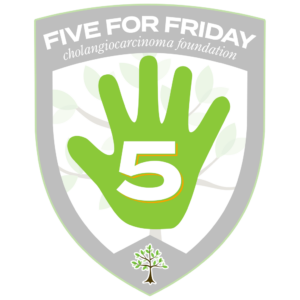
Five for Friday – 5 takeaways from GI ASCO
Home / Blog / [wpbb post:title]
The American Society of Clinical Oncology Gastrointestinal Cancers Symposium (GI ASCO) is an annual global symposium that delivers the latest and most innovative science, research, and multidisciplinary educational content in the GI cancers field.
Cholangiocarcinoma Foundation leaders, members of our scientific and medical community, research advocates, and International Cholangiocarcinoma Research Network members (ICRN) attend, participate, and present each year.
Participation keeps us informed on leading-edge research and discoveries and helps to inform our research strategies and collaborations.
We are pleased to share five important take-aways from this year’s GI ASCO.


In a phase II trial, the use of Infigratinib, an FGFR1-3 inhibitor, for chemotherapy-refractory unrespectable or metastatic cholangiocarcinoma with FGFR2 fusion or rearrangement results in 12.2 months overall survival and 7.3 months progression-free survival. This trail result lay the groundwork for providing infigratinib a Fast-Track Designation by the FDA. There is currently an ongoing phase III study of infigratinib versus gemcitabine/cisplatin in the front-line setting. (Abstract 265)

The Phase III ClarIDHY trial for mutant IDH1 unresectable or metastatic cholangiocarcinoma treated with Ivosidenib showed 10.3 months median overall survival compared to 7.5 months with placebo with more prolonged progression-free survival and better quality of life. (Abstract 266)

Continuing medical education (CME)-certified clinical practice assessment for 104 oncologists with the majority practice in the community setting showed that most community oncologists are not confident about ordering biomarker testing and using targeted therapies for cholangiocarcinoma. This study underscores that more effort toward community physician education is warranted. (Abstract 347)

A pilot study of 11 pancreaticobiliary cancer patients aimed to identify the frequency of mutation in ctDNA and its correlation with recurrence rate after curative resection with and without adjuvant chemotherapy. This pilot study showed that the presence of ctDNA mutations associated with a higher risk of recurrence. (Abstract 336)

In a phase II trial, unresectable or metastatic cholangiocarcinoma patients treated with combined pembrolizumab and Lenvatinib showed 8.6 months median overall survival, 6.1 months progression-free survival, and 68% disease control rate. Based on these findings, enrollment in the biliary tract cancer cohort has been expanded to 100 patients. (Abstract 321)
If you have something you’d like to share, please reach out to Allison Deragon at allison.deragon@cholangiocarcinoma.org.